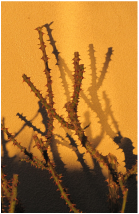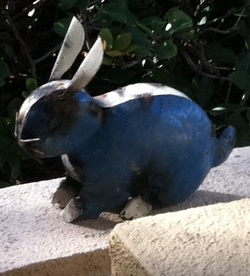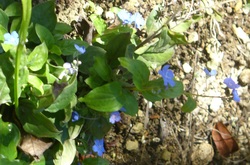The reason not to send gifts late, at night, from a distant address. I intended to to send a beautiful box of pears to a family member and mistakenly addressed it to myself. What to do? I wanted those guys to have those pears, but by the time I was home after the holiday and discovered the problem, the pears were very ripe. I decided to recapture my canning skills and found a beautiful recipe for spiced pear butter on epicurious.
Oh, the smell of pear, vanilla bean, orange, lemon, wine, and cardamon! A lovely way to begin a new year. Back in another era, I was enthusiastic about canning--living on a big property, growing lots of vegetables, putting things up. My mother helped me get all the equipment--not so much is needed, really, but the technical aspect delighted me. So many stages. The time and the timing: crucial. If you are really doing it, it must be done when things are ripe. And they are plentiful, and the process takes time. So much time on your feet over a hot stove. And it must be done properly. Lives and health, not just a good taste, depend on the seal. That so-satisfying pop of the lid after it comes out of its boiling bath.
We live in a new era of sustainability. Just back from Portland, the land of green living and slow food, but also of new tech and busy-ness. Where do we find the time to combine profession and the amateur arts of living? If the new year is time for resolution, or for a projection of hope for a different future, I'll send out a query on this topic. I resolve to think more about how to sort out, carve out times for rediscovery of old ways, slow ways of sustaining life.
I'm saying good-bye to one computer and hello to another. All the files are transferred, and now it's just a matter of unplugging the machine and putting another in its place. It feels like a loss. I've spent many hours in this posture, before this screen--which isn't exactly a screen but a space of creation and negotiation. Of thinking, or sometimes maybe not quite thinking but the movement of fingers on keys and the flow of words--or whatever these orderly little shapes would be called in the technical language of computer-generated text. Right now, they are pleasantly upright (but modest) and gray against a background of a white square and all poised on a sea of tranquil blue water. But whatever they are, the feeling is in the history--the hours and hours spent in just this posture, just this reassuring pattern of movement within this small patch--my own but more.
The psychoanalysts would have a term for this feeling perhaps--the bond, it seems almost physically present between my eyes and the screen. That reassuring physical routine. Is it anything like working with the earth? The rhythm, the geometry. It feels like plane geometry and is in a way, but in both cases, there is depth below the field of vision, depth of knowledge and practice, and also a future-directed temporality. A three- or four-dimensionality. If I do this now--type this word, prune this cane, work in this fertilizer--which looks perhaps quite unpromising in the moment--there will be something to come of it later.
The new machine is sleek and black. It will take some time to lay down a few layers of molecules around it--breath, oil, maybe a little sweat. Dirty up the screen a little. It inherits from the old machine, but who knows what all those files will look like transplanted? Maybe revitalized, or maybe not that important any more. Still growing.
 Take them down! All the way! Leaves and all! My mother's voice rings in my head at this time of year. It took me many years to persuade myself to prune roses properly. It just seemed too cruel, especially here where they've grown above my head by the end of the season, and some of them still seem quite green and alive even in January. Here they are in their stripped down state, a thorny beauty in this stark simplicity--black line drawings against the pale stucco wall. The winter sunset angling across the garden throws them into dramatic relief. Only a few bushes will fit, and these have grown sturdily but so randomly. It's difficult to achieve the pruning ideal: three major canes in an urn shape with space in the middle. My bushes seem to want to grown many cross-wise canes. It's like those digressive strands of thought when you are trying to write something serious--trying to stay on track--and some attractive idea goes off in a certain direction, and you follow it for awhile before realizing that you've really gotten too far away from the main point. And then another and another. What to do?
If it were, say, an aloe or a crocosmia (with its proliferating corms), you could divide it and create another project, or plant. With a rose, no. There is a discipline to be followed, and following it will reward you later. The rose--most luscious and excessive of plants with its extravagant blooms, intoxicating aromas, and fearsome thorns--requires the most rigorous treatment at this juncture. You know what's to come by the newly swelling red seams in the canes, by the memory of the shiny, perfect, intensely dark green leaves on the short spring bushes, and then the blooms. In my mind as I cut is the anticipation of a familiar drama unfolding.
 The day after the day after the new year: it's warm and dry in the small garden, and the internal garden is wilting a bit. Do you feel the space left after the crush of people subsides and before the rush of work floods in? Recalibrating thought, appetite, pace of movement. Disposing gifts, finding their new places in the domestic order.
And in the process, the garden gets a new resident. Here gardens have to be adapted to the presence of real rabbits or suffer. The nurseries sell "rabbit-proof" plants. I felt triumphant this year that I kept lobelia with its psychedelically blue flowers alive in planters the lobelia-loving rabbits couldn't reach. Checking online just to make certain I was remembering the name of this plant, I found a page on the University of Maryland Medical Center site on "Complementary medicine" (also "altmed") where lobelia is described as an herbal remedy for asthma and was also used to induce vomiting. An active ingredient in this gorgeous little plant, they say, was thought to have an effect like nicotine. It may release dopamine, but it can also be toxic. This explains a lot. The lapine consumers of my former lobelias--mowed down to the roots in a single night--were either puking their little rabbit guts out in the bushes or frolicking with gay abandon.
Will the actual bunnies notice the new blue metal bunny? I should put him or her down on the ground to find out, but for the present, I'm appreciating her kooky, crafty pose on the wall. She's poised to pounce and sneaks up on you, if you aren't paying attention. A stationary object becomes antic and mobile when you aren't looking. It's a gift to bring out the playfulness in a serious person--to throw the calm and order of the small garden off kilter just a tick or two. In a time of reordering, getting things lined up, it's good to be jostled a little. A person could perhaps get over-invested in the fine-tuning of the interior design. Throw a blue metal bunny into the mix and see what happens. A bit less wilting . . .
Here is some self-serve New Year's advice in the sophistic mode. The sophists loved antitheses--pairs of words that seem to be "opposites," though nothing is really the "opposite" of another thing if you really think about the worlds within words. The rhetoric of the holiday card is exhortative: have a wonderful time, live large, be safe, let there be world peace. For those of us too cautious to demand something so simple and comprehensive, here is an alternative style of greeting. From these pairs, take what you need. You may even wish to add more categories: adjectives and adverbs, conjunctions or particles? Enjoy, as they say--or ponder.
Nouns:
resolution/abandon
jobs/freedom from work
music/silence
cross words/crosswords
poetry/prose
family/world
life passages/continuities
Verbs:
read/listen
hunker down/rise up
occupy/move on
cultivate/lie fallow
bring order to your world/let chaos engulf you
buckle down/give it up
teach/learn
The quarter is ending, and my writing students are bringing their work together in this brutally short time for creation, cultivation, and fruition. Plato's Socrates in the Phaedrus uses the figure of the forced bloom in his attempt to persuade Phaedrus that speaking is better than writing:
Socrates: Now tell me this: take a sensible farmer who has seed he is anxious to tend properly and wants it to yield him a good full crop: would he seriously plant it during the summer, and in forcing-areas at that, and then take pleasure in the spectacle of a fine crop on the eighth day? If he ever did such a thing, wouldn't it be just for fun or to meet the needs of a special festival? But with seed that he was really serious about, wouldn't he make full use of scientific husbandry and plant it in suitable soil and be perfectly satisfied if it came to maturity in the eighth month?
Phaedrus: As you know, Socrates, the latter would be a serious act, the former quite different, and motivated as you say. [¶276, trans. Helmbold and Rabinowitz]
We didn't get to decide, my students and I, about the terms and conditions of our work. We were brought together under conditions this Socrates suggests are more like "fun" or a "special festival" than a serious planting, informed by scientific husbandry aiming at a good full crop. These are not the conditions allowed by the 21st-century university in California.
And yet--one could do worse than to be thrown together with 26 lively minds for ten weeks, with the chance for "fun" and "spectacle" and "special festival." The intensity, the speed, the friction of words and images sparking against each other from week to week; words resonanting from within 26--27 with me--mind-chambers and out into our common space. There's an excitement there, and sense of urgency: we must say what we have to say and get it out and around because the time is short.
Generations matter here: younger people move faster, think faster. Let them urge us on, get us moving. In California, after all, most things grow really fast. We can revel in the fun and special festival of the words we generated in ten weeks.
.
An entirely free day. Free--so unstructured by appointments, but capturing the freedom inside is another thing. The Santa Ana winds are whipping around in the small garden. Nothing like the ferocity of the winds in Pasadena, uprooting hundred-year-old trees. But rattling the shades. Southern California weather systems are perturbation dependent--as are some people I know--thriving on crisis. These winds have whipped out a couple of hundred urban trees, trees with shallow root systems because they live in the suburbs. We don't need to carry that figure too far. Things thrive where they thrive. There are shallow root systems in "nature": the cypresses along the Guadalupe River in central Texas have shallow roots. Their "knees" angle up from the river bank, and when the floods come, they are washed away. They are only a few hundred years old, after all, having been brought by French Jesuit missionaries.
But history and nature can take you only so far, and then you need more recent experience, like tubing on the Guadalupe, a cooler of beer in its own separate tube, feathery cypressses shading you from the Texas heat. Watch out for the rapids! They can take you and the cooler under in a moment.
And then where is your freedom? Facing into those winds. Bob Seeger comes to mind: Against the Wind. "Little somethin' against the wind." Go with the wind, or face it with your "little something." That's your freedom.
 Saturday, 5 November 2011
Listening to Cassandra Wilson while writing an academic article. What do you listen to when you work? Nothing? Silence is good. It leaves space for thought. If you listen, does the music match the time of day, the nature of the task? I should probably be listening to a neat, tight Mozart piano sonata while I write—especially during the day. Cassandra is night-time music. And now she’s drawing me away from the serious subjects of my writing.
But that tension, or, better, oscillation, may be good. Do we create in a deep, separate mental space, or one that’s constantly cross-cut by other thoughts? It gets especially quiet when I write. Zoe the cat gives me a lot of space. To have the company of a voice, a pulse, another creator--
Outside my window the Mexican sage juts crazily in all directions, the purple and white racemes going off like mild backyard fire-crackers, and the hummingbirds can’t get enough—cruising through, their motion catching my eye every few seconds. A winter-blooming plant, as my Portland daughter reminds me. It rained yesterday—a rare event in Southern California. Everything is washed clean, and if I get up and look east, I can see the San Gabriel Mountains covered with snow. It’s a moment we talk about in the neighborhood in the fall. Have you seen the mountains? The snow-covered mountains? As though they are our special property, which they are in a way—this perspective on them. Pulling us out of the suburban order, pulling us toward the almost-mountainous, up and out of our day-to-day.
|



 RSS Feed
RSS Feed